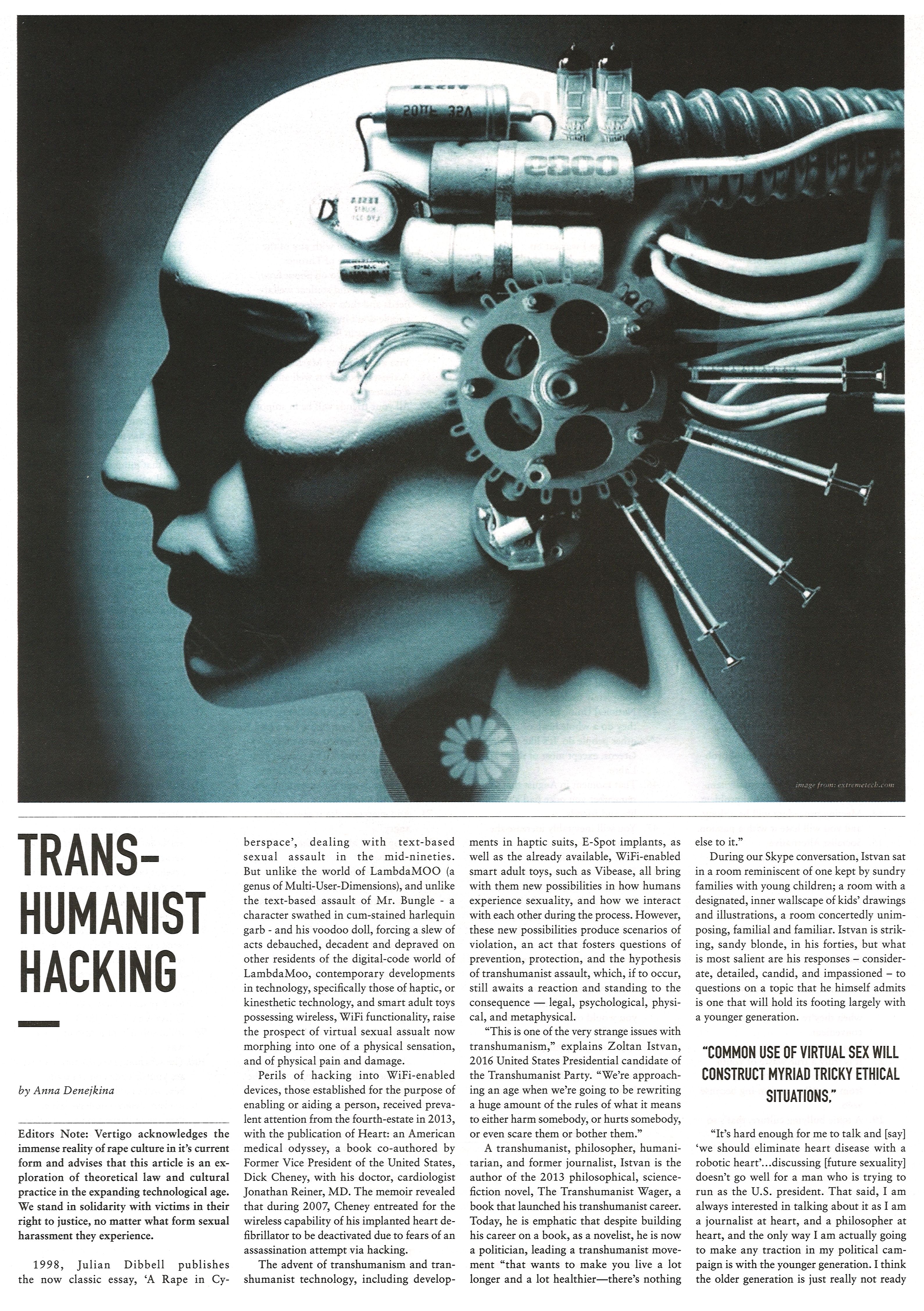Page 11847
Jun 8, 2015
How textiles repeatedly revolutionised human technology — Virginia Postrel | AEON
Posted by Seb in category: materials
“The story of technology is in fact the story of textiles. From the most ancient times to the present, so too is the story of economic development and global trade. The origins of chemistry lie in the colouring and finishing of cloth. The textile business funded the Italian Renaissance and the Mughal Empire; it left us double-entry bookkeeping and letters of credit, Michelangelo’s David and the Taj Mahal. As much as spices or gold, the quest for fabrics and dyestuffs drew sailors across strange seas. In ways both subtle and obvious, textiles made our world.” Read more
Jun 8, 2015
‘We’re a long way from a singularity’ says ‘Ex Machina’ AI consultant — by Luke Westaway c/net
Posted by Seb in categories: robotics/AI, singularity

On-screen robots tend to rise up and crush their puny human masters with alarming regularity.
“I decided to log every single incidence of artificial intelligence or robots in the history of cinema,” Adam Rutherford, a British geneticist and author who served as AI consultant on the recent film “Ex Machina”, tells CNET’s Crave blog. “I think I calculated that 65 percent of them end up being a threat, and the rest of them are just servile.” Read more
Jun 8, 2015
NASA is investing in eco-friendly supersonic airplane travel — By Mike Murphy | Quartz
Posted by Odette Bohr Dienel in categories: business, environmental, government, science, sustainability
NASA said that if all goes to plan with these studies, it sees the first business-jet-sized supersonic planes going into production by 2025, and commercial planes by 2030.
Jun 7, 2015
CRISPR, the disruptor — Heidi Ledford | Nature
Posted by Seb in categories: biological, DNA, environmental

“Researchers are considering how CRISPR could or should be deployed on organisms in the wild. Much of the attention has focused on a method called gene drive, which can quickly sweep an edited gene through a population. The work is at an early stage, but such a technique could be used to wipe out disease-carrying mosquitoes or ticks, eliminate invasive plants or eradicate herbicide resistance in pigweed, which plagues some US farmers.” Read more
An interesting story on transhumanism, virtual rape, and the thorny field of developing laws to protect people in virtual reality. This story first appeared in Australian print magazine Vertigo:
Jun 7, 2015
“Brainprints” Could Be Future Security ID — By Christopher Intagliata Scientific American
Posted by Seb in categories: encryption, neuroscience, security
Biometric technology was once the stuff of sci-fi—how many movies show someone having their hand or eye scanned to get entry into a secured facility? But today biometric tech can be found in millions of people’s pockets—as the fingerprint scanner on an iPhone.
Of course, fingerprint scanning isn’t foolproof. Hackers have stolen fingerprints from photos, and used fake prints to fool Apple’s touch ID. Plus, there’s always the brute force method, like the time a gang in Malaysia cut off a guy’s fingertip—with a machete—to interface with the fingerprint-recognition system on the victim’s Mercedes. Read more
Jun 6, 2015
Meet the New Generation of Robots for Manufacturing — James Hagerty | Wall Street Journal
Posted by Seb in categories: business, economics, robotics/AI

“Another big trend at work: The Renault robots are ‘collaborative,’ designed to work in proximity to people. Older types of factory robots swing their steel arms with such force that they can bludgeon anyone who strays too close. Using sonar, cameras or other technologies, collaborative robots can sense where people are and slow down or stop to avoid hurting them.” Read more
Jun 6, 2015
Exponential Finance: Financial Advice In the Age of AI and Long Life — By Jason Dorrier SingularityHub
Posted by Seb in categories: economics, finance

Ric Edelman is one the top financial advisors in the US. His firm, Edelman Financial Services, has 41 offices across the country. And he thinks, all things constant, most financial advisors as we’ve known them won’t be around much longer.
At Exponential Finance, Edelman said, “I firmly believe that in the next ten years, half of all the financial advisors in this country will be gone.” Read more
Jun 5, 2015
Ex-Googlers Get Millions to Help You Build the Next Google — Klint Finley Wired
Posted by Seb in categories: information science, internet, software, supercomputing

After Spencer Kimball left Google, he found himself missing some of the custom-built software the company uses internally. So he and a bunch of fellow ex-Googlers started building their own. And now they want to make it available to everyone to power the next Google or Facebook.
Specifically, Kimball wanted something like Google’s database system Spanner. Spanner is designed to juggle data between potentially millions of database servers, a tool that keeps Google’s services online even if several servers, or an entire datacenter, go offline. While few companies need to operate at quite the scale Google does, the ability to stay online even if many systems fail, and to automatically balance resources between servers, would be useful to many other companies. Read more











